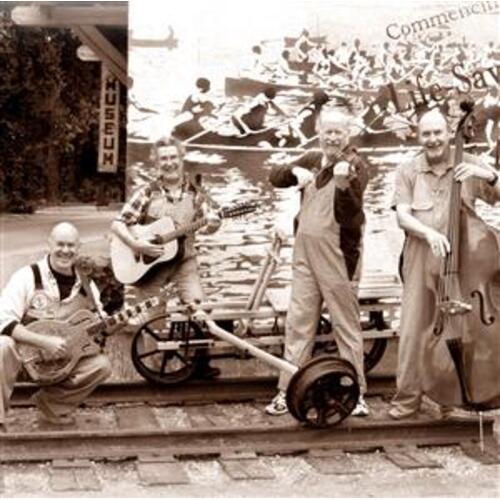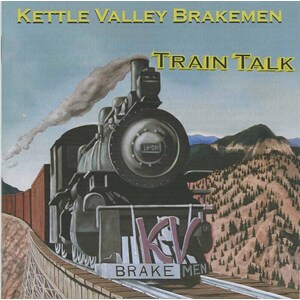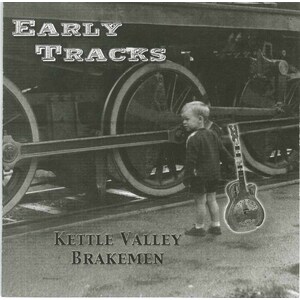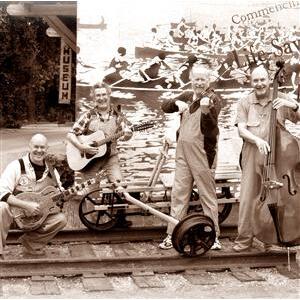Kettle Valley Brakemen
Websites:
https://www.brakemanjack.ca/kettle-valley-brakemen
Origin:
Penticton, British Columbia, 🇨🇦
Biography:
The Kettle Valley Brakemen bring railway history to life with true stories and original songs about British Columbia's dramatic steam train era with special emphasis on the spectacular Kettle Valley Railway. The Kettle Valley Railway (KVR) was once part of the Canadian Pacific Railway and is now one of the most scenic sections of the Trans Canada Trail. In concert, The Brakemen present a blend of unique songs and dramatic or humorous stories as they unfold British Columbia's colourful railway heritage. Hear about the jail break of wily Bill Miner-the 'Grey Fox', deadly train wrecks, railway brawls and even raining rattlesnakes. It's all true!
The Kettle Valley Brakemen have been performing in campgrounds and Concert Halls from The Coast to The Kootenays for the past 25 years and we’re still going strong! What makes The Brakemen unique is our blend of stories and songs around an interesting theme, specifically Western Canada’s steam rail era. For every generation, trains seem to have a magical appeal.
GETTING STARTED
Even before the opening of the Kettle Valley Steam Railway in Summerland, the KVR rail bed was a popular cycling attraction in our valley. The arrival of the tourist train increased traffic and interest in local railway history. As a way to tell that heroic mountain Railway story The Kettle Valley Brakemen was formed. Our first public appearance was at the official opening of the Summerland Steam Train. The Summerland Review featured a page one story about that official opening beneath a picture of The Brakemen performing. So right from our beginning The Brakemen were officially part of Kettle Valley Railway history. Our concerts aim to provide audiences with a musical train ride back into railway history.
OUR MATERIAL
Brakeman Jack researches Canadian Railway history, discover stories that have appeal for people today and turns them (or part of them) into songs; mostly with a folk/bluegrass feel. Jack collected KVR stories from some of the “KV Boys” who fired steam and were alive when he began the Brakemen project. He also immersed himself in KV written history and today, count many KVR chroniclers as friends. After all, Brakemen performances are free advertising for their books. Sometimes authors and trainmen were one and the same. Jack got several wonderful stories from Alan Palm’s “Lions in the Coquihalla” and would occasionally phone Alan about getting the right wording while songwriting. Authenticity matters.
BRAKEMEN LONGEVITY and DIVERSITY OF MATERIAL
While every KV Brakemen concert opens with the band’s “Climb Board!” theme song and always ends with a couple of audience sing along numbers the rest of the program gets changed from show to show depending on audience and venue. Performing in Merritt, The Brakemen always include their song about J.J. Gillis the official KVR doctor who’d lived there. In fact at one Merritt performance Brakeman Jack asked the crowd “How many of you were brought into the world by J.J. Gillis?” More than half the hands in the room went up! That was a friendly crowd! Similarly when performing at the Midway Museum, The Brakemen always sing of 1905’s “Donnybrook in Midway”. Concert goers never know exactly what they’re going to hear and that keeps things interesting for them...and for the band as musicians. For example, in 2015 the 100th anniversary of the KVR, every story/song combo in that year’s performances concerned life on the Kettle Valley Line while by 2017 when Canadians celebrated our 150th birthday, The KV Brakemen included songs with more general historical interest. Including a fascinating railway tale about Sir John A’s wife Lady Agnes MacDonald. The Brakemen try to humanize history through their story/song mix. It works. In business terms, for the past 25 years there’s ALWAYS been a willing market for Brakemen concerts. Since the taming of fire throughout the dark ages and beyond humans have entertained each other with stories and songs. The Kettle Valley Brakemen are proud to be part of this troubadour tradition.
THE UNIQUE APPEAL OF BRAKEMEN SONGS
Audiences love being surprised, amused, and informed while being ENTERTAINED. Being entertaining is job one. All KV Brakemen original songs have a Railway theme but extend well beyond the usual tales of brave engineers and terrible train wrecks. We—tastefully—explore construction camp prostitution, ghost train sightings, raining rattlesnakes, feminism and even constipation! Pick your poison!
Humour engages listeners and is often present in Brakemen stories and songs. What makes Heritage entertaining special is that the band’s story/songs try to INFORM as it entertains. The audience gets “hooked” with the story then learns a little history through the song. Brakeman Jack says, “Our goal is for folks to exit a Brakemen performance being happily entertained BUT knowing more about life in the steam rail era than they did when the show began.”
ANECDOTES OVER THE YEARS provided by Brakeman Jack
Our audition. In the winter before the opening of the KVR in Summerland I approached KVR management with the Brakemen idea. They loved it! I received an offer and a challenge...if I found interesting stories and created songs with audience appeal...The Kettle Valley Brakemen would be given a ten appearance contract to perform on specific dates at the West Summerland station once the line officially opened. This was...IF WE PASSED THE AUDITION. This audition was to take place at the KV Restoration Society’s spring meeting just before the Railway was set to open. Finding musicians and song material was a wonderful creative experience but I knew that for the performances to REALLY work-as story teller-I had to project an “air of knowledge” about steam trains. However, previously I had been a high school history teacher. I’d never sat in an engine cab in fact this audition was the first time I’d ever worn overalls! With a contract for a season of performances on the line I was feeling the pressure. Just before we went on I was told there were FOUR retired KV steam engineers sitting in the front row judging us. That didn’t help my ability to focus! Fortunately, they loved our songs celebrating their own contribution to Okanagan railway Heritage. The Brakemen later were invited to perform for these old KV Boys at their annual summer barbecue reunion-and poker game-in Brookmere. But that’s another story...
2. “Hey kids, let’s put on a show! BRAKEMEN MUSICAL THEATRE
In 2003 the Brakemen play “Kettle Valley Memories” was staged with multiple performances in both Penticton and Peachland. Actors brought each of our historical stories to life then lights would come up on the band for the appropriate song. We included lyrics to some of the song choruses in the programme so each performance evolved into a giant sing along. We Brakemen had support from two Penticton theatrical companies and (in true community theatre spirit) once we all realized we were producing something ORIGINAL, a lot of positive energy was generated. Alana Mathews wrote a wonderful review of Kettle Valley Memories that (alas) the local newspaper didn’t publish. No, it wasn’t Shakespeare but everyone involved had great fun...plus we played to full houses and sold lots of CDs!
3. The Myra Canyon Trestle Re-opening 2008. The Kettle Valley Brakemen shared in Kelowna’s misfortune when a wall of fire destroyed the Myra Canyon Trestles—along with 239 Kelowna homes—in 2003. Our regular “concerts for cyclists” business went up in smoke. The Brakemen memorialized Kelowna’s tragedy in “Okanagan Firestorm” a song that we recorded and placed on our web site as a free download right next to the address for donations to the Trestle Restoration Society. We included “Okanagan Firestorm” as an encore number for Kelowna audiences for the next couple of years. The song was played as backdrop in a news feature on CHBC at the time. People did download it and I know people did donate. I don’t know whether this affected Ken Campbell’s thinking when his Myra Canyon Restoration Society asked us to perform before a large audience (including the national press) at the Official Re-opening of the Myra Trestles in 2008. One of our songs concerns the challenges Myra Canyon presented for steam trains. To be singing “Myra’s Majesty” beside the rail bed looking down on that trail of trestles hanging on the Myra Canyon walls at that official Re-opening was a tremendous personal thrill. And, once again The Brakemen were taking part in KVR history!
WHO HIRES US?
Museums, Heritage attractions, regional summer Music in the Park programs and Seniors Societies throughout the Okanagan keep The Brakemen busy. Naturally for a Heritage Act like The Kettle Valley Brakemen, Canada Day gets booked up early. For many years we performed July 1st concerts shuttling between two Okanagan communities on the same day! The appeal of Brakemen concerts for museum curators is that The Brakemen bring Locals in the door—even if only to buy concert tickets. However we HAVE performed intimate concerts INSIDE museums all across southern B.C including multiple years with shows in Midway, Osoyoos, Penticton and Revelstoke. The Peachland Museum which is tiny hosted several of our concerts in Heritage Park on the beach.
As for appropriate Heritage sites, we’ve played a lot of them from Fort Steele in Cranbrook to the B.C. Railway Heritage Museum in Squamish including in our Okanagan: The O’Keefe Ranch, the Grist Mill and (of course) The Kettle Valley Steam Train in Summerland.
BRAKEMAN JACK
This version of my life is meant to be a thumbnail sketch and is written for those who want to gain an insight into how my songwriting style developed. Sorry, no juicy personal smut revelations here.
I was born and raised in Vancouver and slid through the school system without learning much or making waves. I did see--from grade five onward--that there were far more engaging ways to present knowledge and inspire learning than what my teachers were doing. I realized the need for educators to address the question "Beyond passing a test, why should students care about this stuff?" I thought that if a teacher spent the first couple of minutes of each class "hooking" the students emotionally on the subject matter for that class, student interest would go up and discipline issues would go down. From that time on I wanted to be a teacher. I was always a voracious reader and by high school I began doing crossword puzzles. I used to cut out the daily puzzle, take it to school and work on it during class time when I got bored. I believe crosswords are valuable to songwriters because you get in the habit of searching for words that "work" and this skill is useful for both puzzles and songs. Solving cryptic crosswords takes the whole working with words issue to a much higher level.
Growing up on the west side of Vancouver made attending the University of British Columbia an easy thing to do. My home was a twenty minute car ride from campus and I was able to get an education without having to pay for room and board. Thanks mom and dad! It was the late 60's and U.B.C. had more freedoms and attractions than I'd experienced up to that time but the classes themselves (history, sociology and English) remained irrelevant to my life. Scholarships and bursaries paid my tuition and I earned spending money by selling cameras at a Vancouver department store. One day a representative from Kodak gave us new weekend employees a pep talk on selling and his presentation gave me a perspective that affected my salesmanship, later my teaching and also my songwriting approach. He divided the reasons to buy a particular camera into "red points" (technical features of that camera) and "blue points" (how the camera would make picture taking interesting). You combined a red point with a blue one when selling. Eg. "This camera has a top shutter speed of 2000th of a second (red point) it will let you stop a raindrop in mid-air" (blue point). The idea was keep up a steady stream of red points and blue points until the person said, "I've gotta have this camera!" It worked like a charm.
Once I began teaching high school I discovered that my insight about learners cooperating once they saw value--FOR THEM--in what was being taught was true. In fact, even if my students couldn't see value for themselves, the fact that I was trying to show them value in what I was presenting encouraged them to go along with the lesson. If most of the students believe you are a benign force then the potential "disturbers" go along without making trouble. Eventually, another social studies teaching buddy and I traveled to educational workshops around the province pushing this message in a workshop entitled "History is not just dates and facts". At the conclusion of every course I taught during my 18 years as a high school teacher I had students fill in course evaluation forms that re-enforced my belief in the value of hooking student interest before proceeding.
Eventually the "good groove" of teaching began to become a rut. The most important quality of an effective teacher is the ability to listen--I began to exhibit the great failing of talking more than I was listening. Besides, I had always lived in the big city and wanted to try life in the slow lane. The Okanagan valley is a five hour drive from Vancouver and I had been vacationing there for years and in 1991 my wife and I moved to a cottage on Lake Okanagan in the dreamy little village of Naramata. I knew that I wanted music to play a bigger role in this next stage of my life and when the Kettle Valley Steam Railway got running in Summerland in the mid-1990's I formed The Kettle Valley Brakemen (www.kvbrakemen.com) a folk/bluegrass act. I used my history research skills from teaching to develop KVR stories that (initially) I'd tell before the group performed traditional train songs. About the same time I began writing my own train songs and my philosophy for writing was based on what I'd learned was effective in both camera selling and teaching-- hook the listener's emotions.
All singer/songwriters who've paid their dues in bars and coffee houses love an attentive audience and my evolution as a songwriter is a "happy ending story" because I find myself playing intimate venues for people who really want to hear the songs. It doesn't get any better than that.
It's important at the outset for me to define the type of popular songwriting that interests me. There are some songwriters who express their emotions in such a powerful way that the listener is carried along on the writer's vocal quality and poetry--thus moved by the song. The flash of inspiration is important to the success of this writing style and many such songs are completed in one sitting. I read where Hank Williams dictated "Your Cheatin' Heart" to his second wife as he was driving away from the court house after divorcing his first wife. She wrote the lyrics down on an envelope. This is not the sort of songwriting I do. Mine are story songs. They are based on discovering a tale worth telling and developing an effective way to deliver it to an audience. These are "folk songs" in that I want "folks" to listen to the stories and like them. Flashy musical hooks and repetitive or incomprehensible lyrics--no matter how "mood creating"--aren't appropriate for what I do.
The focus of my approach to songwriting is more didactic than that of artists who pour out their hearts in music (a la Hank Williams) and includes three stages. Once I get that "this would make a great song" feeling, I let the concept roll around in my mind for a while. In this time I'm establishing exactly WHAT ONE THING must the song be about and from what point of view can it be expressed most effectively. I think of this as the "ideation" stage. There's no specific amount of time for this process but it ends when I feel compelled to pick up pen and paper and start drafting the first outline and sketch for the tune. By outline I mean what subject matter needs to go in each verse and what theme will be the focus of the chorus--or does it need a chorus? Would a bridge or key change increase the song's impact? Do I hear a waltz? Writing down--in sentence or point form --the ideas for each verse gives way to expressing those ideas more poetically and gradually the song sketch is born. Sitting down to simply RE-COPY my sketches always results in beneficial changes. To me, this sketch phase is the "ugly duckling" stage of songwriting. My sketches contain way to many words, are often watery in terms of focus and impact. I know this sounds weird, but in the process of grinding and polishing the sketch, an idea for a tune evolves in my head. This happens once the sketch progresses to the stage of me deciding which musical style (bluegrass, blues, folk, rock or gospel) would be most effective. The third stage is "polishing" and it consists of dumping the sketch into the computer, printing out the song and singing it several times a day looking for more effective wording and eliminating those "flinch factors" (any aspect that doesn't feel right). For me, this polishing stage can take weeks. As it goes on, the actual number of changes involved become fewer but--like the final small adjustments in focusing a telescope--they significantly increase the song's impact. I know this process is finished when I look forward to singing the tune and come to believe in it.
While the range of material on "No Train Today" is fairly eclectic, the philosophy behind the songwriting is consistent with my background as a heritage performer. The troubadour tradition stresses emotionally engaging the listener as immediately as possible. Establishing a reason for the audience to want to hear out the song seems like a basic of success. My other recorded material consists of train songs celebrating Canada's steam rail era. In other words, it's all history and while some might enjoy hearing a history song from time to time, a heritage entertainer has to quickly "hook" the listener. The history itself isn't good enough, the listener must become emotionally engaged.
Fortunately there exist guaranteed appeals for getting and holding people's attention. These appeals include: mystery, shock, humor, horror, sex, nostalgia and surprise. Blending a couple of these into songs is the key to success. No wonder stand up comedians tell so many "dirty" jokes, they are a blend of humor, sex and surprise. A sure fire winner in holding human attention. Similarly, people will sit through a long "shaggy dog" story because they anticipate surprise and humor as their reward. On "No Train Today" I've employed all of these techniques to try and hold the listener. In terms of personal style I prefer humor to horror, but in the song "When The War Was New", the subject matter demands it.
Finally, being an "indie" artist I've had the freedom to be playful with this CD. No suit from corporate dictated terms to me. Thus I can leave in a little studio talk and some sound effects have been added that--hopefully--add to the disc's impact. Enjoy!



